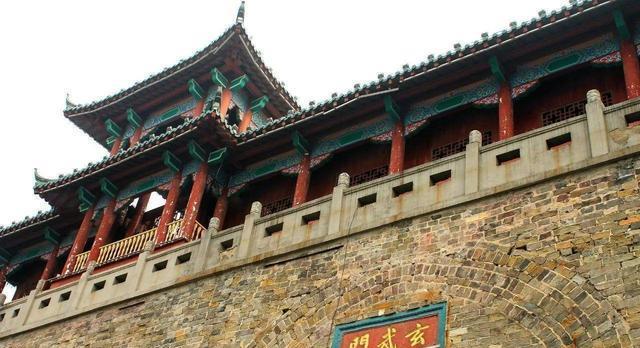"Zhongyun Gong is famous for washing horses, and who mourns when the old staff accompany them?" The bowman bent in the lake hall, but he spilled his nose back to Yi Qiu. This "History of Yong" poem writes about the "change of XuanwuMen" and the historical fact of Li Shimin's brothers' cannibalism, pointing to the change of dynasties and the bloody and lawlessness in the change of power. It's very deliberate. Li Jiancheng, together with Li Yuanji and Li Shimin, competed for the throne, and in the "Xuanwumen Revolution", Li Shimin shot his brother Li Jiancheng with a bow and arrow, and Wei Chi Jingde helped kill Li Shimin's brother Li Yuanji.

Wang Jue and Wei Zhengben were subordinate officials of the crown prince, and after the death of the crown prince, they were still in official positions, so they requested a funeral for the old lord Li Jiancheng. When Li Shimin ascended the throne and succeeded to the throne, he posthumously crowned the late crown prince Li Jiancheng as the King of Qi, Li Yuanji the Prince of Qi as the King of Thorns, the quasi-Wang Jue and Wei Zheng accompanied the funeral to the tomb, and the old staff of the palace were ordered to participate in the funeral ceremony, and he himself went to yiqiu gate to cry and sacrifice. Which of these is the real mourner?
How can we hide the tragedy of brotherhood? "Who mourns when the old staff escorts?" It's a question. "Bending bows in the lake hall, but spilling back to Yiqiu", is to use the artistic technique of overlapping to strengthen the function of ideography:
It was the murderer who killed people in the Linhu Temple, but shed tears at the funeral ceremony at Yiqiu Gate, not to sincerely mourn, but to cover up the truth of brothers killing each other for the throne. But the atrocities of the mischief cannot be washed away.
Many of the court battles in ancient China were fought among the emperor's immediate family members within the ruling clique: When King You of Zhou deposed Shen Hou and Crown Prince Yi usu, he made his favorite concubine Qiu Zi Zi a prince, and after the contradiction intensified, Shen Hou colluded with Inuyasha to send troops to attack Zhou, and King You's soldiers were defeated and killed;
During the Southern and Northern Dynasties, the Southern Dynasty Song and Qi imperial families continued to kill each other because of the great feudal king with the same surname, and the result was rapidly falling apart; after the Sui Emperor seized the position of prince by double-faced tactics, he conspired with Yang Su to murder Emperor Wen of Sui and the deposed prince Yang Yong;
The Tang Dynasty also underwent the "Xuanwumen Revolution" before unifying the country, and when Emperor Suzong of Tang died, the empresses, princes, feudal kings, and eunuchs in the ruling clique fought bloodily for the throne;
In the early Ming Dynasty, zhu Di, the King of Yan, launched the "Battle of Jingnan" to seize the imperial power of Emperor Jianwen, and Emperor Mingyingzong re-ascended the throne by killing his brother Emperor Daizong through the "Battle of the Gate"; until the Ming and Qing dynasties alternated kangxi succession, there was an uninterrupted, cruel and bloody court struggle between fathers and sons, couples, and brothers and relatives within the imperial family for supreme power... This is the historical record that Naranjand can see when he reads history.
The Kangxi Emperor's generation was facing a struggle for power between the brothers of the princes. Of the more than fifty sons and daughters born to Kangxi, nine princes participated in the struggle of the "Nine Kings to Seize the Concubine", and its complexity and cruelty developed to the "highest" degree of court struggle in Chinese history, so that the Kangxi Emperor himself fell into the extreme anxiety of "being killed by the dove today, being killed tomorrow, and being cautious and restless". (Records of the Ancestors of the Qing Dynasty, vol. 291)
Fortunately, Naran was not a prince, and his family background as a courtier could make him a "mountain prime minister and a god on earth". And the prince can only face the altar of the highest power: he can be an idle prince with no ambition, and enjoy his life without doing anything;
Either be an ambitious person full of heart and bear the end that will inevitably be faced by the king and the loser; or the brothers support each other, you are on top, I help you to be high, avoid the sword and light sword shadow; or swear to die to meet each other or the candle shadow axe, burn it once and let the truth become a mystery forever, or choose to watch the brother shine, leave a beam of light for yourself, play a safe role and slowly grow old...
As the son of the pearl of power, Naranjande is actually in a safe zone, which is his luck. There is an unspoken meaning in the poem "History of Yong", which is also the reason why the young Manchu noble prince always has "worries about the end" in the court.